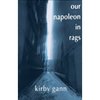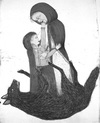Geek Fight, Geek Fight!
New Scientist has a forum going for the "Best Space Sci-Fi Works Ever," including threads on So-called "Women"s Science Fiction Books and a longish thread of Top 5s. (Via Senses Five.)
Geek Fight, Geek Fight! Read More »
New Scientist has a forum going for the "Best Space Sci-Fi Works Ever," including threads on So-called "Women"s Science Fiction Books and a longish thread of Top 5s. (Via Senses Five.)
Geek Fight, Geek Fight! Read More »
 It’s Kirby Gann week over at the LBC, where we’ll be discussing Our Napoleon in Rags. I just threw up a starting post a few minutes ago. Stop by and join in. Should be fun.
It’s Kirby Gann week over at the LBC, where we’ll be discussing Our Napoleon in Rags. I just threw up a starting post a few minutes ago. Stop by and join in. Should be fun.
(And I definitely expect to see you there, because I know you’ve read the book.)
From Some Rules of Writing by Nicola Griffith (one of a fairly extensive bunch of pieces over at the Online Writing Workshop, about which I know very little):
One of the clearest markers of bad writing is, in my opinion, the unexamined cliché. Think hard about every single word and phrase you use. Don’t write "her heart stopped" unless you mean she died. Don’t talk about saucy serving wenches in an inn where the beef stew is thick and hearty and the ale is fresh, nutty, and strong…unless you intend to use such a cliche to good effect, to twist it upon itself and the reader for a purpose. (Why aren’t "serving wenches" ever tired, middle-aged women? Why, in worlds with no refrigeration, is the meat never spoilt–or intensely flavored with spices to prevent/slow down said spoilage? Why is the beer rarely yellow, or thin, or cloudy with sediment? Why do barbarians always "come down from the north"? Why do people who fall over the edge of cliffs always "scrabble for purchase?") Stereotypes such as sly Arabs, money-lending Jews, feisty old women, dignified and wise kings, comic-relief peasants, green-eyed and raven- tressed heroines with "mouths just a bit too wide for beauty" and pert noses are signs of lazy writing and/or a failure of imagination. Many clichés are "self-evident truths": women are weaker than men; Americans are superior to Africans; humans are more innovative than aliens; women-only worlds would be boring, homogeneous places where the inhabitants sit around all day and think about men; capitalism is fabulous; all cultures appreciate art; genius is more valuable than compassion; straight men are more butch than gay men; Christians are more reasonable than Moslems; war is inevitable. The list is endless (or at least very, very long). All writers commit cliché to some extent, but the better you are, the less often you’ll do it. Clichés undermine fiction; they’re like rust on the cables suspending the reader’s disbelief. One is a little unsightly, but many mean that disbelief will come crashing down, your books or story will be tossed aside, and you will have lost a reader forever.
Writers Need Lists Read More »
 The first or "blue" issue of the Fairy Tale Review is a promise made good. It hardly seemed possible glancing through the announced table of contents that it could deliver, bold as it was with the names of some of my favorite writers: Stacey Richter, Kim Addonizio, Aimee Bender, Donna Tartt. Not to mention that all the contributions in titles or other familiar names had the air of fabulousness about them. I’ve heard a lot of buzz about a lot of new literary magazines and journals and even when they manage to deliver, it’s rarely in full.
The first or "blue" issue of the Fairy Tale Review is a promise made good. It hardly seemed possible glancing through the announced table of contents that it could deliver, bold as it was with the names of some of my favorite writers: Stacey Richter, Kim Addonizio, Aimee Bender, Donna Tartt. Not to mention that all the contributions in titles or other familiar names had the air of fabulousness about them. I’ve heard a lot of buzz about a lot of new literary magazines and journals and even when they manage to deliver, it’s rarely in full.
The Fairy Tale Review, on the other hand, is a joy of constant surprise throughout. I’ve read it clean through today (after getting it in the mail yesterday) and I can’t remember the last time I honestly liked every piece in a magazine and loved more than one. And while the issue itself feels unified, the individual pieces are very different, some radically so, and it’s a wonder that nothing here feels out of place or even weighs down the whole. Kate Bernheimer is an editor queen.
…
Women, Wolves and Wonders: Fairy Tale Review Read More »
The posts are flying fast and furious over at the LBC as the boys discuss Lance Olsen’s 10:01. Here’s the first in the series by World Fantasy Award nominee Matt Cheney. Like Matt, I was heavily reminded of Geoff Ryman’s far better 253 (which I urge you to read as soon as you finish all those posts):
What this book reminded me of again and again, and to its detriment, was Geoff Ryman’s 253, which started out as hypertext and eventually was published. 253 can be both (or alternately) tedious and addictive, but I generally feel that the writing is better than in 10:01, perhaps because it is less intent on creating various voices, a technique I find cloying unless the writer is a particular sort of ventriloquistic genius. Comparing the two works is unfair on the whole, though, because they are quite different, but that’s one of the dangers that comes with writing a book primarily driven by its structural concept — it begins to look a lot like other books primarily driven by their structural concepts.
Next week’s discussion is of Kirby Gann’s Napoleon in Rags and I’ll be participating in that one (because it was my favorite). That’s probably it for this fine, blustery Friday. Good weekends all round.
Don’t you just love it when your sister tells funny stories about almost killing you when you were kids? Especially if you just won a Nobel prize? The AP picks up a localized story from Paducah:
"We made mud pies, and I remember one time I almost killed him," she said. "We were playing in a sandbox and he made me eat some sand. So I then made him eat it, and he almost choked."
Berry didn’t detect anything special about her brother, Robert Grubbs, or have any hint that he’d win a Nobel Prize.
But, Grubbs did just that. The Royal Swedish Academy of Sciences on Wednesday awarded the Nobel Prize in chemistry to Grubbs and two others for their development of the metathesis method in organic synthesis.
*Grubbs was born in the Howard’s Grove community of Marshall County, which he described as part of the Gilbertsville-Calvert City-Possum Trot triangle.
Possum Trot Triangle* Boy Makes Good Read More »
Anne at the Vertical blog is back with a fabulous new edition of the Finger In The Throat (FITT) report, this time tearing into Marlon Brando’s posthumous novel Fan Tan (written with the help of Donald Cammell). It hurts so good:
Then, there’s the way Asian men look, very important, of course:
"In many Chinese faces there was a frightening cast to the skull. To Annie, the fashion in which the eyeballs nestled in their slots (just say it Brando, say "slits"!!!), protected by bone, suggested the priorities of survival and the inevitability of violence." (Later today on Judge Judy: "Your Honor, I killed him because I gots me these small little eyes stuck in the deep in my head-slots! It’s a natural priority!")
And because this makes me laugh even harder:
Well, if it weren’t enough that Chinese men have no smiling flex points in their facial skin, a lot of them are also dwarves:
"The coolie pointed out how large and heavy Annie was, and Annie kept agreeing, asking if the rickshaw man had ever offered a rebate to a small person – a dwarf, say, of which there have always been many in China."
Read the rest. Guarantee you’ll get the "high" points of Fan Tan.
From the NYT story on the recreation of the Great Influenza pandemic strain:
But Dr. Jeffery Taubenberger, chief of the molecular pathology department at the Armed Forces Institute of Pathology in Washington, had an idea for finding that ancient virus. He recalled that his institute had a warehouse of autopsy tissue, established by President Lincoln.
Dr. Taubenberger investigated and found tissue from two soldiers who died of the 1918 flu, one in Massachusetts, one on Long Island. The tissue was snips of lung soaked in formalin and encased in little blocks of wax. In that tissue was the virus, broken and degraded, but there, untouched for nearly 80 years.
This just in: Lincoln planned to raise army of zombies.
Honest Abe Lincoln’s Zombie Contingency Plan Read More »